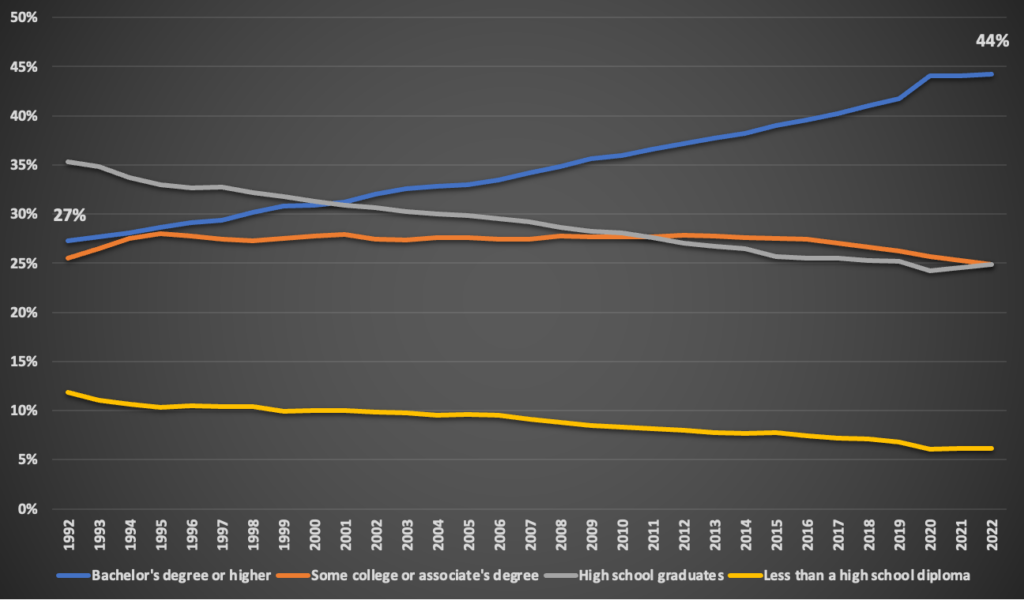Dropping unnecessary degree requirements is good for workers and the economy
According to data from the Bureau of Labor Statistics (BLS), in 2022, about 44 percent of all workers aged 25 and over had a bachelor’s degree or higher. But in 1992, the proportion of workers in that age category with a bachelor’s degree was only 27 percent. Between 1992 and 2022, the share of workers over 25 with a bachelor’s degree or higher has risen by 63 percent. And during the same period, the share of workers with less than a bachelor’s degree has fallen in all categories.
Figure: Percent of workers aged 25 and over by education attainment, 1992 – 2022

Source: Bureau of Labor Statistics
To the extent that jobs have become so complex and demanding that only a college degree endows workers with the skills necessary to fulfill their duties, such a rise in degree attainment is laudable. It signals an improvement in human capital that would likely lead to increased productivity.
The evidence, however, signals, that this is not entirely the case. Jobs haven’t gotten more complicated or demanding. While there have been some changes, numerous jobs that require a college degree do not necessarily need skills that can only be attained through a college degree. Instead, the rise in college credentials can be attributed to what is termed degree inflation — a growing number of employers requiring degrees even when it isn’t necessary.
Degree inflation and how it hurts workers and the economy
According to a 2017 study published by Havard Business School, in 2015
67% or production supervisor job postings asked for a college degree while only 16% percent of employed production supervisors had one.
That is employers were requiring applicants to have a college degree for jobs for which current employees are doing just fine without a college degree.
According to the report, this trend is attributed to two factors. Firstly, the nature of middle-skill jobs has been changing. Secondly, employers are unsure of hiring non-graduates who might often not only have skills particular to the job but lack soft skills as well. Ergo, employers default to using a college degree as a proxy for both technical skills and soft skills.
But this is harmful in a lot of ways as numerous studies have documented. College inflation prevents companies from finding skilled workers. At the same time, it keeps perfectly skilled non-college-educated workers out of lucrative job opportunities. And as a result, the economy becomes less efficient.
More can be done to remove barriers to employment for non-college-educated workers
Numerous private employers have already taken action to eliminate their college requirements or reduce job requirements. These include IBM, Google, and Walmart.
On Monday, Governor Walz signed an executive order dropping degree requirements for 75 percent of state jobs. Not to condone the unprecedented expansion of state government or executive orders, but such a move will likely open up job opportunities for skilled non-college-educated workers and help the state fill its numerous job openings.
Requiring a college degree for jobs that don’t need them is a waste of resources, especially considering the high cost of higher education. It also limits the potential that employers can tap into, hampering our economy. It’s a positive trend that more employers, including our state government, are recognizing that skills matter more than credentials.
That same thinking should be applied to our burdensome occupational licensing regime which is in urgent need of reform.